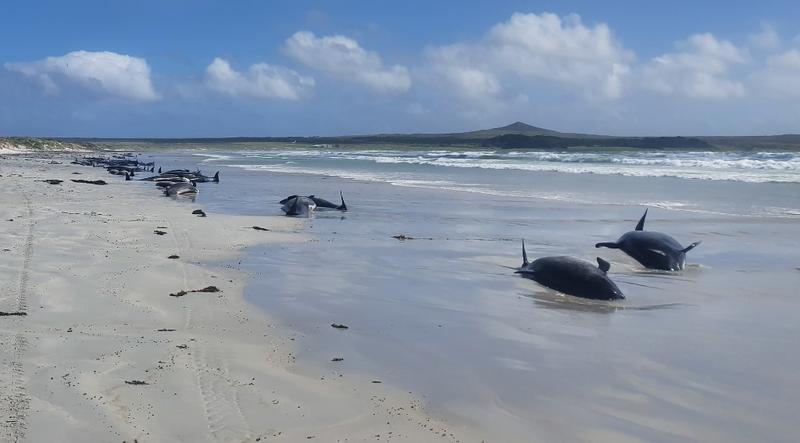 This handout photo taken on Nov 22, 2020 and received on Nov 25 from the New Zealand Department of Conservation (DOC) shows some of the 100 dead pilot whales stranded on New Zealand's remote Chatham Islands. (NEW ZEALAND DEPARTMENT OF CONSERVATION / AFP)
This handout photo taken on Nov 22, 2020 and received on Nov 25 from the New Zealand Department of Conservation (DOC) shows some of the 100 dead pilot whales stranded on New Zealand's remote Chatham Islands. (NEW ZEALAND DEPARTMENT OF CONSERVATION / AFP)
WELLINGTON - About 100 pilot whales and bottlenose dolphins have died in a mass stranding on the remote Chatham Islands, about 800 kilometers off New Zealand's east coast, officials said on Wednesday.
Most of them were stranded during the weekend but rescue efforts have been hampered by the remote location of the island.
Only 26 of the whales were still alive at this point, the majority of them appearing very weak, and were euthanized due to the rough sea conditions and almost certainty of there being great white sharks in the water which are brought in by a stranding like this.
Jemma Welch, Biodiversity ranger, Department of Conservation, New Zealand
New Zealand's Department of Conservation (DOC) said in total 97 pilot whales and three dolphins died in the stranding, adding that they were notified of the incident on Sunday.
ALSO READ: 6 whales refloated after stranding on New Zealand beach
"Only 26 of the whales were still alive at this point, the majority of them appearing very weak, and were euthanized due to the rough sea conditions and almost certainty of there being great white sharks in the water which are brought in by a stranding like this,” said DOC Biodiversity Ranger Jemma Welch.
Mass strandings are reasonably common on the Chatham Islands with up to 1,000 animals dying in a single stranding in 1918.
READ MORE: 145 pilot whales die in stranding on New Zealand beach
Mass whale strandings have occurred throughout recorded modern history, and why it happens is a question that has puzzled marine biologists for years.
In late September, several hundred whales died in shallow waters off the Australian coast in one of the world's biggest mass whale strandings.


